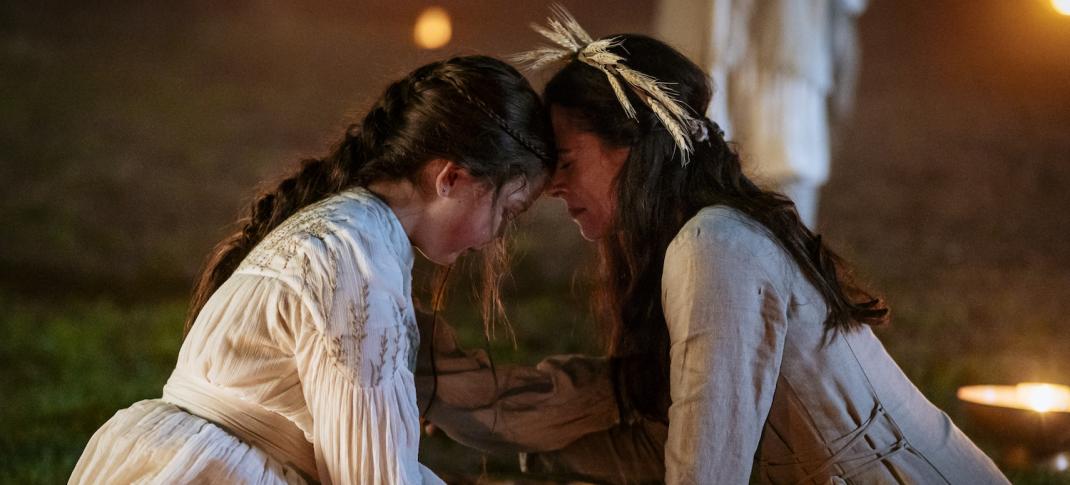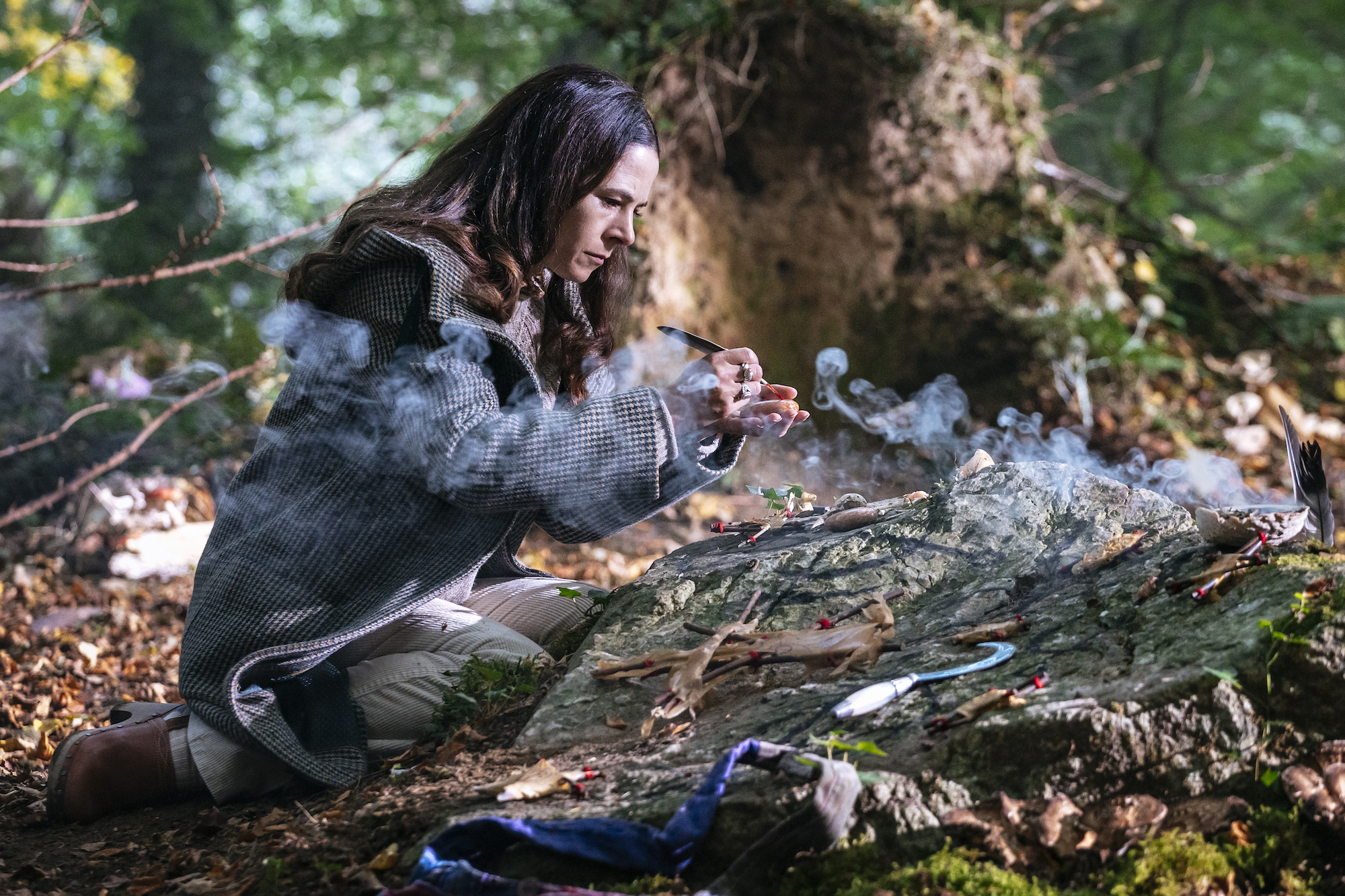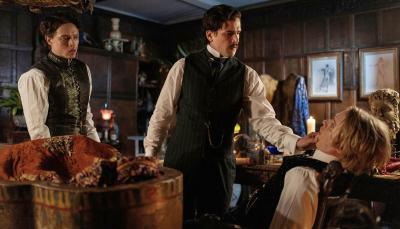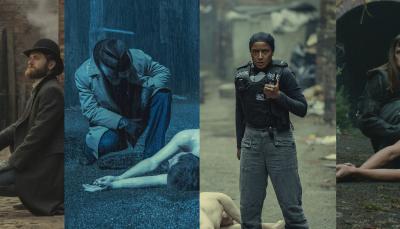She’ll Put a Spell on You: 'Sanctuary: A Witch’s Tale' Revels in Womanhood

Elaine Cassidy in "Sanctuary: A Witch's Tale"
(Photo: Sundance Now)
In the AMC+/Sundance Now limited series Sanctuary: A Witch’s Tale, the small UK town of Sanctuary is home to “registered” witch Sarah Fenn (Elaine Cassidy) in a reality where magic is real and witchcraft is regulated by the law. Based on the novel by V. V. James, a murder investigation ensues when the most popular boy in town is killed and witchcraft is blamed. A tense, bewitching drama that also plays with horror aspects, Sanctuary has a richly woven plot where the mystery is teased out in a very satisfying way.
Sarah is the only witch in Sanctuary, earning her living by working spells for the townspeople. She is best friends with town mover and shaker Abigail (Amy De Bhrún). Together with two other nonmagical friends, the four women are a coven who meet regularly to charge Sarah with their energy. Tragedy strikes when Abigail’s son, Daniel (Max Lohan), falls to his death at a warehouse party. Things get complicated when Sarah’s daughter Harper (Hazel Doupe) is accused of using magic to kill him. Although Harper is nonmagical, Abigail’s staggering grief drives her to believe the accusations. She mounts a campaign against magic and, ultimately, Sarah and Hazel.
Following Daniel’s death, Abigail spirals. She endures the worst loss a parent can experience, and it destroys her. She cannot contain her pain and inflicts it outwards. She is also clearly shown to have an unhealthy hero-worship relationship with Daniel, as does all of Sanctuary. Everyone mourns Daniel, and when Abigail leads a literal witch hunt, she has the support of pretty much the entire town. There’s a point where the townspeople collectively lose their minds, and mob mentality takes over. This has plenty of parallels to modern society, particularly in social media.
The theme of transactional relationships comes up repeatedly. The phrase “something given for something gained” is a magical principle Sarah lives by and which is used against her. It shows how tentative her arrangement is with Sanctuary: magic goes from celebrated to vilified practically overnight, propelled by gossip and fear. Public perception transforms Sarah from a trusted eccentric to a dangerous and suddenly foreign influence. Even amongst her friends, Sarah’s generosity with her gifts creates a dependency and a degree of expectation. Abigail’s demands are particularly egregious, and she becomes dangerous when refused.
There are plenty of critiques of small-town corruption and the politics of opinion. Sanctuary’s police chief, Bolt (Stephen Lord), appears cooperative initially but interferes with the investigation led by out-of-town DCI Knight (Stephanie Levi-John). Knight attempts impartiality, and thorough police work, but Bolt undermines and overrides her when she won’t arrest Sarah and Harper for the witchcraft he’s sure is to blame.
Consent is of prime importance in this world’s use of witchcraft. Rule number one is that witches must have the consent of those upon whom they perform magic. Relatedly, rape is a significant part of this story. The series shows the horrific double victimization that too often happens when a woman comes forward: she isn’t believed and, worse, gets blamed. It is maddening (and reflective of reality) to see the different ways characters react, which include dismissal, disbelief, and excusal. The show deftly examines the all-too-common practice of protecting the abuser and smearing the accuser, as well as the double standard of men being celebrated for promiscuity while women are labeled sluts.
The persecution of witchcraft is historically linked to sexuality and the perception of women having too much power. Witches were frequently blamed for natural disasters, crop failures, disease, and deaths of prominent community figures. Sanctuary does an excellent job of bringing this into a modern context. The overall magical atmosphere is eerily beautiful, steeped in folklore, and skillfully designed. In particular, the distinctive hand movements that Sarah uses to cast spells look like a form of sign language.
Sanctuary features phenomenal acting by the entire cast, which is predominantly female. There’s a frustrating naïveté to Elaine Cassidy’s Sarah, a kind of detrimental optimism that the actress crafts perfectly and uses to showcase Sarah’s faith in magic to remedy everyday problems. Hazel Doupe nimbly navigates the intricacies of teenaged Harper, unpeeling her anger and bringing the audience ever more into her fold as her story is revealed. Amy De Bhrún brings the house down as antagonist Abigail, spewing disdain with her piercing expressions and chewing the scenery left and right once she really leans into her villainhood.
This female-centric story explores all kinds of womanhood in both positive and negative aspects. It is a great show made even better when it draws on themes of marginalization and discrimination. Ultimately, this is magic in a bottle.
Sanctuary: A Witch’s Tale premieres on AMC+ and Sundance Now on Thursday, January 4, 2024, and streams one episode a week through the end of February.






